SUMMARY
This is AI generated summarization, which may have errors. For context, always refer to the full article.
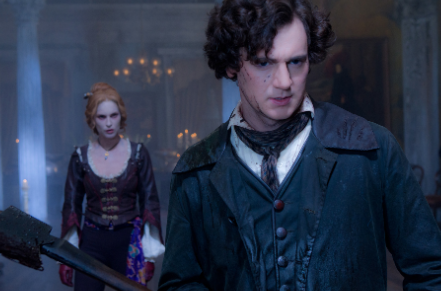
MANILA, Philippines – One of the quieter moments in Abraham Lincoln: Vampire Hunter shows the rising politician of the title at a ball with would-be wife Mary Todd. As they dance, the eventual US President declares to the lady, “I have taken an interest in you” — even though they had met just once before (and she’s engaged to future senator Stephen Douglas, to boot).
This kind of cut-to-the-chase, to-hell-with-sensibility approach runs rampant in the film adaptation of Seth Grahame-Smith’s revisionist novel of the same name. While the tack keeps things lean at 105 minutes, it deprives the movie from being a more full-bodied experience — as if a vampire had helped itself to the film’s proverbial blood.
What’s the matter here?
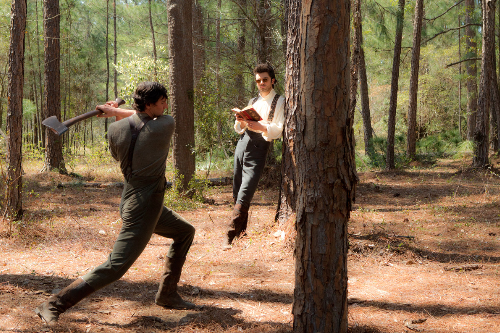
Contrary to what many critics have cited, the problem with Abraham Lincoln: Vampire Hunter is not the plausibility of its very title’s promised premise. After all, Grahame-Smith’s novel — his second mash-up tale following the success of Pride and Prejudice and Zombies — was a deft and satisfying weaving of fact and fiction, positing the existence of vampires throughout the 16th American president’s life story rather convincingly.
Neither is lack of humor this movie’s gaffe, despite the supposed absurdity of the title. Scriptwriter Grahame-Smith’s best-selling tome was largely serious in tone, accentuating the harsh realities of Lincoln’s life and times, offering but a few snatches of humor.
Meanwhile, director Timur Bekmambetov’s own output — the Russian vampire films Night Watch and Day Watch and the slam-bang Angelina Jolie starrer Wanted — is richer in violent, balletic action than in sharp, comedic banter.
So given the clamor for it to be a jokey, camp affair, Abraham Lincoln: Vampire Hunter could well be the Most Misunderstood Movie of the Year.
The trouble with Abraham Lincoln: Vampire Hunter as theatrical fare is not even that its creators — with the blessing of co-producer Tim Burton (his recent Dark Shadows remake was also Grahame-Smith-scripted) — opted to focus on the action and, a rather distant second, on the horror movie potential of imagining honest Abe as a clandestine slayer of the fanged undead.
No, the real problem with the movie is its very length, its relative brevity.
Short but not sweet
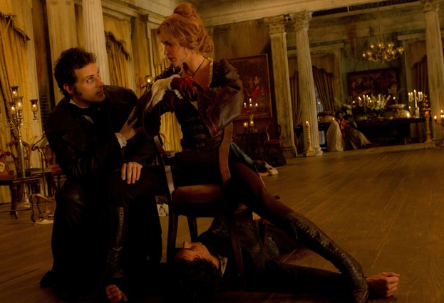
To keep things under two hours (and in turn keep production costs down), milestones in Lincoln’s life are crammed while many others are shunned.
Even the facts about him that made it into the movie are arrived at in haste, the narrative flitting from one point to the next as if leaping precariously between distant steps. And so the progression from precocious Abe chopping wood to adult Abe lopping off vampires’ heads is essayed too quickly to be absorbing. (And the film may be an uncut, R-13 treat but its monsters are not scary so much as freaky.)
The audience, especially those of us not as fully acquainted with the big man’s life story, ends up being passive consumers of eye candy instead of being emotionally invested viewers. Had the filmmakers considered fashioning Abraham Lincoln: Vampire Hunter into a re-imagined biopic with an extra 30 minutes of storytelling juice, the movie would have been as satisfying and compelling a work of fiction as the book is.
Like a bat, man
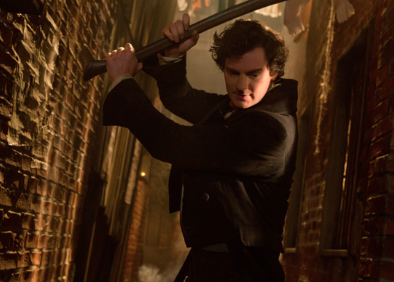
That said, the film is not entirely a letdown. In Bekmambetov’s hands, the proceedings are often brisk and visceral, with many of the establishing shots swooping in swift forward motion as if to mimic a bat’s flight.
The cinematography by Caleb Deschanel (who had photo-directed The Passion of the Christ, among others) is mostly glorious, enhanced by the use of digital projection — thankfully available in digital 2D, which is just as crisp as the movie’s 3D edition.
Some of the action set pieces are thrilling enough, best embodied by a scene featuring a herd of stampeding horses which, while entirely fake but for actors Benjamin Walker and Marton Csokas (playing Lincoln and a bloodsucking plantation owner, respectively), brims with engrossing, panoramic tension.
The actors themselves are not inconsiderable, led by Walker the relative newbie in an okay turn as the mutton-chopped, axe-swinging emancipator — never mind the man’s distracting resemblance to a cherubic Bill Murray and, as a much-older Lincoln, to Liam Neeson.
The story is the star
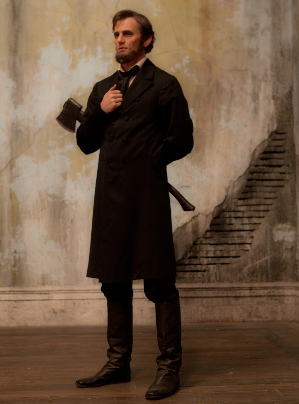
The key element in the entire movie, beyond its chief protagonist, is the story itself, or what’s left of it in the transition from page to screen — told as memories supposedly culled from Lincoln’s lifelong journal.
Indeed: missing plot elements vis-à-vis the source material abound, the climax is not as credible as the original’s (the vampires here turn out to be dumber than their centuries-old existence would have us think) and the book’s epilogue is far more laudable than the movie’s.
Still, the flick manages to subliminally serve up a portrayal of Lincoln as a superhuman being, not by vanquishing vampires per se but in facing them as a formidable force — first on a personal level, eventually on a national scale.
In depicting the slaves of Lincoln’s time as not just oppressed servants but also as vampire fodder, Grahame-Smith’s story also stresses the real-life horror of pre-Emancipation America. By the end credits, you might even ponder one of the movie’s quotable quotes, “We’re all slaves to something,” wondering what monstrous force we the people are up against now and who shall stand tall and lead the way.
But oh, this could have been better. Instead of a chop shtick of a flick, we could have gotten a resplendent diversion, one that would have made the combination of violence, shocks and history a mash-up made in movie heaven.
Who knows? Maybe four score and seven years from now, future fathers would bring forth a more satisfying cinematic take on Abraham Lincoln: Vampire Hunter — one conceived in liberty and dedicated to the proposition that movies can be greatly entertaining. – Rappler.com
Add a comment
How does this make you feel?
There are no comments yet. Add your comment to start the conversation.